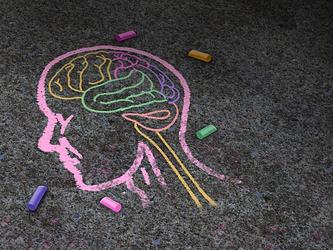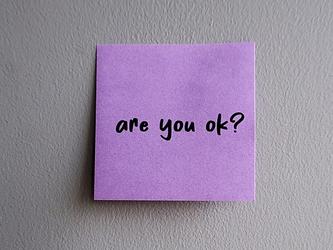Essential safeguards: mental health
The MRS standards team has continued to add to the essential safeguards series of guidance, with the aim of guiding our members in the prevention of harm, a key construct of the MRS code. The latest addition to the series covers mental health.
One in four people in the UK will have a mental health problem at some point. While mental health problems are common, most are mild, tend to be short term and are normally treated successfully, with medication, by a GP.
Mental health is about how we think, feel and behave. Anxiety and depression are the most common mental health problems. They are often a reaction to a difficult life event, such as bereavement, but can also be caused by work-related issues.
The impact and experience of the Covid-19 outbreak has been different for everyone – as has how we have reacted – but there is no doubt it has been a really difficult time for us all. Increasingly in these strange times we find ourselves living in, participants are commenting that they are suffering from depression, express an intention to self-harm, or are even considering taking their own life. More and more of our members are contacting the confidential Codeline advisory service to ask how they can help in these situations, so let us explore this further.
Scope of guidance
The guidance aims to help practitioners identify the signs of anxiety and depression to assist in their professional activities. The relevant clause within the MRS Code of Conduct ( 2019 ) is MRS Code Rule 9: Members must take all reasonable precautions to ensure that participants are not harmed or adversely affected by their professional activities and ensure that there are measures in place to guard against potential harm.
What is anxiety and depression?
Anxiety
This is what we feel when we are worried, tense or afraid – particularly about things that are about to happen, or which we think could happen in the future. Anxiety is a natural human response when we perceive that we are under threat. It can be experienced through our thoughts, feelings and physical sensations. Some symptoms of anxiety may include:
- Feeling restless
- Being agitated
- Struggling to sleep and eat.
Many people feel anxious at times. It is particularly common to experience some anxiety while coping with stressful events or changes, especially if they could have a big impact on your life.
Depression
Depression is a low mood that lasts for a long time and affects your everyday life.
In its mildest form, depression can mean just being in low spirit. It does not stop you leading your normal life, but makes everything harder to do and seem less worthwhile. At its most severe, depression can be life-threatening because it can make you feel suicidal. Some common signs of depression:
Appearance:
- Down, upset or tearful
- Restless, agitated or irritable
- Hopeless and despairing
- Suicidal.
Behaviour:
- Self-harming or suicidal behaviour
- Difficulty speaking, thinking clearly or making decisions
- Difficulty remembering or concentrating on things
- Moving very slowly or being restless and agitated.
What can be done?
Mental health issues can be a fluctuating characteristic that may not necessarily be obvious at first glance. If it is known that the topic of the data collection is likely to cause distress, it is advisable to take steps to address any adverse effects that may occur.
What should you do if a participant describes a mental distress – for example, a participant comments about
suffering from depression, self-harming or mentions having suicidal thoughts?
Prepare – be able to provide helpline numbers, charity details and any other information that can offer support and help.
Assist – offer to put the participant in touch with individuals or services that can provide support and help. Bear in mind that this must only be done with permission of the participant – they must agree what will be revealed, to whom and for what purpose.
Be aware – learning of others’ mental health issues can be distressing to hear. You may need support as a practitioner when these issues emerge in your professional activities. Talk to someone, such as a colleague or a workplace mental health adviser – it is often helpful to share such experiences.
A final thought…
The easing of Covid-19 restrictions will allow us to get back to the people and things we love, but it is important to remember that some participants may be worried about taking part in face-to-face data-collection activities. Even positive change can lead to anxiety, and it can take time to readjust to things we have not done for a while.
Always ensure that participants are not pressured to take part and that a participant’s right to withdraw from a project at any stage is respected. Don’t forget to regularly check the MRS website for any updates to the guidance for face-to-face data collection.
Feelings of post-lockdown anxiety are likely to pass with time, as we get used to the ‘new normal’, but it is important to do what we can to take care of our own and others’ mental health.
Charities, helplines and communities
Anxiety
Anxiety UK: anxietyuk.org.uk
Mind: mind.org
Time to Change: time-to-change.org.uk/
Depression
Living Life to the Full: llttf.com
Samaritans: samaritans.org
Rethink: rethink.org
Under-19s can speak to Childline: Call Childline on 0800 1111 or visit childline.org.uk
Hub of Hope: hubofhope.co.uk
Reading Well: reading-well.org.uk/books
THIS ARTICLE WAS FIRST PUBLISHED IN THE OCTOBER 2021 ISSUE OF IMPACT.

We hope you enjoyed this article.
Research Live is published by MRS.
The Market Research Society (MRS) exists to promote and protect the research sector, showcasing how research delivers impact for businesses and government.
Members of MRS enjoy many benefits including tailoured policy guidance, discounts on training and conferences, and access to member-only content.
For example, there's an archive of winning case studies from over a decade of MRS Awards.
Find out more about the benefits of joining MRS here.














0 Comments